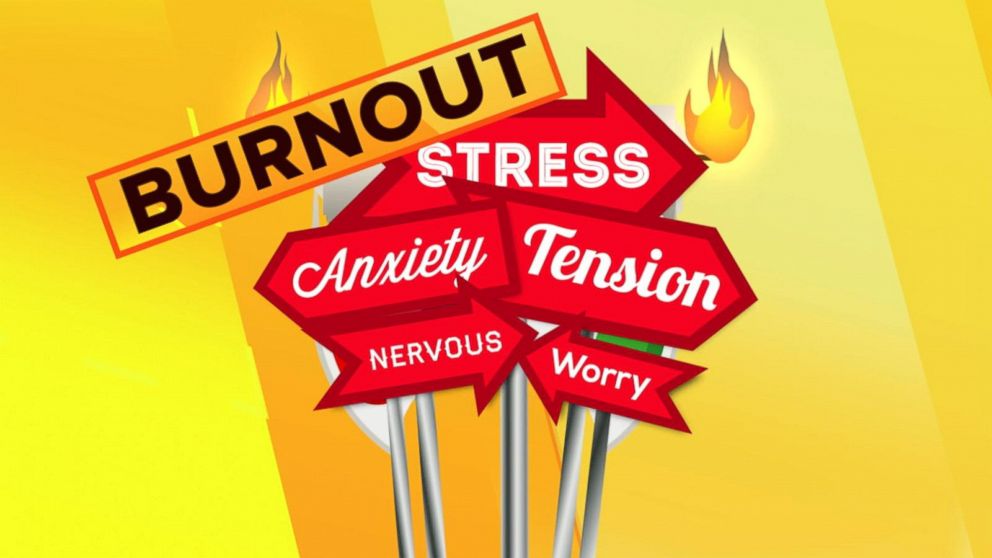Work-place burnout is now officially a recognized mental health concern: What you should know
Four questions can help determine if you are suffering from burnout.
Burnout -- the type of extreme stress or fatigue that can lead to everything from respiratory problems to gastrointestinal issues -- is now officially a recognized mental health concern.
The World Health Organization (WHO) included burnout in its International Classification of Diseases, or ICD-11, a diagnostic tool for medical providers.
Burnout, called an "occupational phenomenon" by WHO, is described as "resulting from chronic workplace stress that has not been successfully managed." The guidelines note that burnout is only applicable related to work-induced stress.
The handbook says medical providers can look for these three symptoms when it comes to diagnosing burnout: Feelings of energy depletion or exhaustion; increased mental distance from one’s job or feelings of negativism or cynicism related to one's job; and reduced professional efficacy.
The ICD-11 diagnosis guidelines will not go into effect until 2022.
In the U.S., medical providers follow another set of guidelines, the Diagnostic and Statistical Manual of Mental Disorders, or DSM–5. Burnout is not listed as a diagnosis in DSM-5.
Burnout among millennials was in the spotlight late last year when BuzzFeed reporter Anne Helen Petersen described in an essay how she could excel in her job and some parts of her personal life but felt paralyzed in others.
"I’d put something on my weekly to-do list, and it’d roll over, one week to the next, haunting me for months," Peterson wrote of what she labeled "errand paralysis."
"They are seemingly high-effort, low-reward tasks, and they paralyze me," she wrote.
Signs of burnout can include insomnia, chronic fatigue, difficulty concentrating, apathy, irritability, anxiety and getting sick more often. It can have physical consequences that include everything from respiratory problems to gastrointestinal issues, according to ABC News chief medical correspondent Dr. Jennifer Ashton.

Are you suffering from burnout?
There are four questions you can ask yourself to determine if you are suffering from burnout, explained Ashton.
Rate yourself on each question using a number one through four, with one being never, two sometimes, three often and four always. Then total your points from all four questions.
1. How often are you tired and lacking energy to go to work in the morning?
2. How often do you feel physically drained, like your batteries are dead?
3. How often is your thinking process sluggish or your concentration impaired?
4. How often do you feel emotionally detached from co-workers (or customers) and unable to be sensitive to their needs?
If you scored less than nine, you are not suffering from burnout.
If you scored between a 10 and 12, you are on the verge of burnout.
If you scored between a 13 and a 16, you are suffering full-on burnout.
How to help burnout
Bea Arthur, a New York City-based licensed therapist, recommends starting to ease burnout by removing the urgency from things in your life that are truly not urgent.
"You know what is urgent in your life, like seeing your family and friends more," said Arthur, who tries not to answer work-related emails and calls past 7 p.m. because she knows, in her work, nothing tragic is going to happen if she answers in the morning.
She also schedules her vacations three and six months in advance, which lets her know that she can take a pause.
"Even if the work is still there when you get back from vacation, you’ll come back better," she said.
Ann Shoket, author of "The Big Life," said the millennial women she meets are often fixated on small things that distract from their bigger lives.
She recommends being intentional about the type of self-care you give yourself.
"I don't mean get a mani[cure] and facial," Shoket told "GMA" earlier this year. "It’s about putting yourself first once in a while. Turn off your phone. Leave work at a reasonable hour. Draw boundaries between your life and your work that allow you to succeed in both.”
Accepting that your life can be big and messy is also good way to move forward, noted Shoket.
"You have to embrace the mess," she said. "Don't get caught up in the idea that things have to be perfect or there has to be a balance. A big, ambitious hungry life is a messy life."
Amy Kurtz, a bestselling author and health and wellness coach, works with her clients to "flip the script" on burnout by establishing personal rituals, from practicing meditation to getting exercise, eating a healthy diet, getting proper rest and setting boundaries on your apps and phone.
She also stresses the importance of saying no.
"If it's not a heck yes, it's a heck no," Kurtz said. "If you’re not totally jazzed about doing something, just say no."







